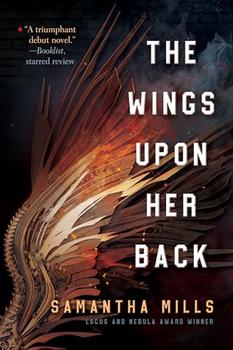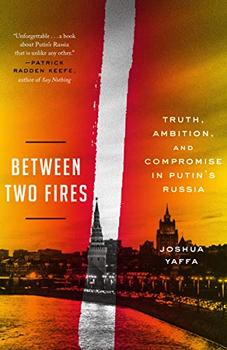Summary | Excerpt | Reviews | Beyond the book | Read-Alikes | Genres & Themes | Author Bio

A loyal warrior in a crisis of faith must fight to regain her place and begin her life again while questioning the events of her past. This gripping science-fantasy novel from a Hugo, Nebula, Sturgeon, and Locus Award-winning debut author is a complex, action-packed exploration of the costs of zealous faith, ceaseless conflicts, and unquestioning obedience.
Zenya was a teenager when she ran away from home to join the mechanically-modified warrior sect. She was determined to earn mechanized wings and protect the people and city she loved. Under the strict tutelage of a mercurial, charismatic leader, Zenya became Winged Zemolai.
But after twenty-six years of service, Zemolai is disillusioned with her role as an enforcer in an increasingly fascist state. After one tragic act of mercy, she is cast out and loses everything she worked for. As Zemolai fights for her life, she begins to understand the true nature of her sect, her leader, and the gods themselves.
Excerpt
The Wings Upon Her Back
There is a question which has preoccupied me for many years:
What is Radezhda?
I can already hear your complaints. Why, it is a city, of course! In that case, I ask you: what is a city?
Creator Stasia wrote that a city is a related network of roads. But this cannot be true. Some of our roads extend clear through the mountains, and we do not claim all the land alongside them there, nor the municipalities where they continue on the other side. This is clearly the musing of an engineer—I built it, therefore it is mine.
Is a city a cluster of homes, then? This answer seems satisfactory when considering an isolated community such as ours, but there are many more cities in the world which neatly abut one another. We find ourselves in the same situation as we were with the roads—where to call an end to it? We include the farmers in our cityhood, and they do not even reside within the city walls.
Borders, then! That is the purpose of borders. To mutually ...
This extraordinary book examines the faith of one woman at two different turning points in her life. The child Zenya renounces familiarity and family to answer the call of a god she believes in with every fiber of her being, only to learn that there is still more she must give up to prove herself. The jaded, broken warrior Zemolai, cast off after one misguided act of mercy, is faced with a reckoning that threatens to shatter her once rock-solid faith entirely. What Mills does so expertly is elicit the same level of empathy from the reader for a woman at two wildly different life stages. In alternating chapters, we watch both journeys: the child learning that her fantasies of heroism are not everything she dreamed and the woman coming to terms with those dreams finally and forever breaking up around her in the face of a darker but necessary truth. The reader pines for Zenya to allow room for doubt into a worldview rapidly spiraling into zealotry and for wounded Zemolai to allow herself to grieve for the faith she is losing...continued
Full Review
 (883 words)
(883 words)
(Reviewed by Sara Fiore).
The heart of the story in The Wings Upon Her Back lies in Zenya's hard-fought battle with her faith. Indoctrinated into the service of the mecha god in her youth, she has only ever known faith without question. The deconstruction of that faith and the rebuilding of her identity as a freethinking woman with agency isn't entirely assured by the book's end, but she has taken her first steps toward a worldview based on her own choices and ideas.
Part of what makes Zenya's deconstruction so difficult is her firm belief that anything, be it thought or written word, that even suggests a lack of faith in the mecha god is heresy and therefore dooms her to be cast away from the light of her deity. Deconstructing, or taking apart and examining...

If you liked The Wings Upon Her Back, try these:

by Joshua Yaffa
Published 2021
From a leading journalist in Moscow and correspondent for The New Yorker, a groundbreaking portrait of modern Russia and the inner struggles of the people who sustain Vladimir Putin's rule.

by Margaret Atwood
Published 2020
In this brilliant sequel to The Handmaid's Tale, acclaimed author Margaret Atwood answers the questions that have tantalized readers for decades.




The good writer, the great writer, has what I have called the three S's: The power to see, to sense, and to say. ...
Click Here to find out who said this, as well as discovering other famous literary quotes!